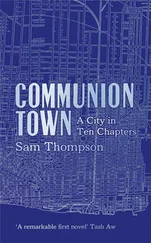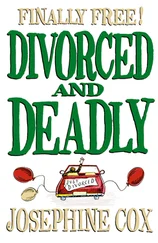Frank Tallis - Deadly Communion
Здесь есть возможность читать онлайн «Frank Tallis - Deadly Communion» весь текст электронной книги совершенно бесплатно (целиком полную версию без сокращений). В некоторых случаях можно слушать аудио, скачать через торрент в формате fb2 и присутствует краткое содержание. Жанр: Исторический детектив, на английском языке. Описание произведения, (предисловие) а так же отзывы посетителей доступны на портале библиотеки ЛибКат.
- Название:Deadly Communion
- Автор:
- Жанр:
- Год:неизвестен
- ISBN:нет данных
- Рейтинг книги:3 / 5. Голосов: 1
-
Избранное:Добавить в избранное
- Отзывы:
-
Ваша оценка:
- 60
- 1
- 2
- 3
- 4
- 5
Deadly Communion: краткое содержание, описание и аннотация
Предлагаем к чтению аннотацию, описание, краткое содержание или предисловие (зависит от того, что написал сам автор книги «Deadly Communion»). Если вы не нашли необходимую информацию о книге — напишите в комментариях, мы постараемся отыскать её.
Deadly Communion — читать онлайн бесплатно полную книгу (весь текст) целиком
Ниже представлен текст книги, разбитый по страницам. Система сохранения места последней прочитанной страницы, позволяет с удобством читать онлайн бесплатно книгу «Deadly Communion», без необходимости каждый раз заново искать на чём Вы остановились. Поставьте закладку, и сможете в любой момент перейти на страницу, на которой закончили чтение.
Интервал:
Закладка:
‘Both are important,’ Liebermann replied. ‘Sprenger’s longing for his mother, his auto-erotic behaviour, his exploratory games with the village girls, his exposure to the caskets, and his necrophilia in adulthood all contributed to his illness. But his wish to commune with the Angel of Death might have remained a wish, and only a wish, had it not been for the lead oxide. It is possible that the poison, over many years, accumulated in those parts of the brain that mediate inhibition. Without inhibitory functioning there was nothing to stop him — and fantasy became reality.’
The two men fell silent and a significant interval of time passed. Somewhere in the building a cello was playing. The notes teased at the limits of audition, suggesting — but never quite becoming — a recognisable melody. Eventually, Liebermann turned towards his friend and said: ‘I think we should consider one other factor that has contributed to Sprenger’s unique presentation.’
‘Oh?’ said Rheinhardt, blinking as he emerged from the closed world of his private cogitations.
‘Us,’ said Liebermann.
‘I beg your pardon?’
‘Us: me — you — all of us — we Viennese. We are utterly preoccupied with sex and death. The signs of this preoccupation are everywhere: in our theatres, art galleries, opera houses, and concert halls. Consider Klimt’s seductresses, or the funeral marches that director Mahler puts in his symphonies. The good people of Vienna are flocking to the opera house in order to see the new production of Tristan and Isolde: a story in which — tellingly — the potions of love and death are confused. Young rakes are always having affairs which end with a demand for satisfaction. What begins in the bedroom progresses inexorably to the grave: prostitutes on the Graben and suicides reported daily in the newspapers — Professor Freud, who has shown us that even a dream of flying is libidinous — Krafft-Ebing — Schnitzler’s promiscuous shop girls — the overblown pomp and macabre ceremony of our funerals — and syphilis, our national disease — always there to remind us of our dual obsession: sex and death. Sick bodies produce symptoms — and the sick body of our society has produced Sprenger!’
Rheinhardt grunted into his brandy glass.
‘You seem to be making an appeal for clemency on Sprenger’s behalf. Let us not forget those poor women: Frauleins Zeiler, Babel, Wirth and Roster.’ Rheinhardt put down his brandy glass and pulled at his lower lip. ‘Just a moment …’ His eyes widened. ‘Sprenger doesn’t mention Fraulein Wirth.’
‘I was wondering how long it would take you to realise that.’
Two furrows appeared on Rheinhardt’s forehead.
‘Why doesn’t he mention Selma Wirth?’
‘He doesn’t mention Selma Wirth — because he has no idea who she is.’
‘What do you mean?’
‘He didn’t kill her.’
‘How can you say that?’
Liebermann lifted the notebook and held it up in the air like a fervent preacher wielding his Bible: ‘What Sprenger has written in here is entirely coherent. One couldn’t fabricate such a history. A fabricated history would be full of anomalies and wouldn’t make sense psychologically. He has not baulked at admitting the murders of Frauleins Zeiler, Babel and Roster, so why should he baulk at admitting to the murder of Fraulein Wirth?’
‘Could the omission of Fraulein Wirth be a failure of memory? You said he is being given morphium.’
‘No, Oskar. Sprenger never knew her. She was killed with a dagger, not a hatpin. We should have given this inconsistency more thought, afforded it greater significance.’ Liebermann allowed his words to register and waited for the alarm to show in Rheinhardt’s eyes, before adding: ‘Fraulein Wirth’s murderer is still at large.’
‘Dear God,’ said Rheinhardt, picking up his glass again. Liebermann poured him another brandy. The inspector swung his head back and dispensed with the contents like a shot of schnapps. He coughed and repeated: ‘Dear God.’ Rheinhardt turned the empty glass in his hand: ‘What now? Where do we begin?’
‘Frau Vogl?’ Liebermann ventured.
‘Yes, and Fraulein Wirth’s neighbour, Frau Lachkovics. Perhaps they will be able to remember some new detail. The neighbour’s daughter — Jana — was a simple child. I doubt that she will be able to help us more than she already has.’
‘When we questioned Frau Vogl she mentioned seeing a man wearing a bowler hat waiting in the courtyard outside Fraulein Wirth’s apartment.’
‘She did indeed.’
‘And Frau Vogl believed that Frau Wirth was seeing someone — a lover.’
‘It was only a suspicion and if the gentleman wearing the bowler hat was Frau Wirth’s lover why would he have been loitering in the courtyard?’
‘A good question: to which the answer might be that he was waiting in the courtyard in order to observe the arrival of Frau Vogl.’
‘To what end?’
Liebermann shrugged.
‘I don’t know.’
It was obvious to Rheinhardt that his friend had had an idea but was not eager to share it. The inspector, slightly irritated by Liebermann’s evasiveness, voiced his own train of thought.
‘There was also the landlord’s agent,’ said Rheinhardt. ‘Shevchenko. I’ll talk to him again. Fraulein Wirth had fallen behind with her rent. Frau Lachkovics said that her neighbour was in debt because she was always spending money on doctors.’
‘Doctors …’ Liebermann repeated. Then, playing a five-finger exercise on Sprenger’s notebook, he added: ‘Fraulein Wirth had a consultation with Doctor Vogl.’ The word ‘consultation’ sagged under a weight of innuendo.
Rheinhardt spoke sofly: ‘What are you suggesting?’
‘When we left the Vogls’ house I couldn’t help feeling that there was something-’
‘Wrong,’ Rheinhardt cut in. ‘I know, Max. But you didn’t succeed in winning me over to that view.’
‘What if there had been some impropriety?’
‘Between Vogl and Wirth?’
‘Yes.’
‘Well, Vogl wouldn’t have killed Wirth to ensure her silence — if that’s what you’re thinking — even if exposure would have meant the end of his marriage. A man in Vogl’s position wouldn’t take such a risk. Besides, Frau Vogl is a striking, handsome woman — is she not? It seems unlikely that Vogl would have chosen to pursue his wife’s lame friend. What are we to suppose — that while Vogl was examining her wasted leg he was overcome with passion?’
‘She could have seduced him. She could have offered him particular favours — to which men are partial and for which women commonly express distaste.’
‘And why would she have done that?’
‘To spite Frau Vogl.’
‘Frau Vogl was Frau Wirth’s friend.’
‘A beautiful, healthy, talented, successful friend — feted by society and loved by her husband. One could grow to resent such a friend if one was a lame laundry worker.’
Rheinhardt considered Liebermann’s proposal and shook his head.
‘No … you are wrong.’
Liebermann smiled.
‘I might be wrong — but not very wrong.’
‘What are you doing tomorrow?’
‘Actually, I’m having the day off.’
‘Then I hope,’ said Rheinhardt, ‘you haven’t arranged to do anything important.’
55
Liebermann and Rheinhardt met mid-morning for coffee and proceeded directly to Frau Vogl’s salon. On entering, they found the vestibule empty. They waited a few moments to be received but no one came to greet them.
‘What do we do now?’ asked Rheinhardt. Liebermann pointed to an electric bell push mounted on the wall and pressed it.
Читать дальшеИнтервал:
Закладка:
Похожие книги на «Deadly Communion»
Представляем Вашему вниманию похожие книги на «Deadly Communion» списком для выбора. Мы отобрали схожую по названию и смыслу литературу в надежде предоставить читателям больше вариантов отыскать новые, интересные, ещё непрочитанные произведения.
Обсуждение, отзывы о книге «Deadly Communion» и просто собственные мнения читателей. Оставьте ваши комментарии, напишите, что Вы думаете о произведении, его смысле или главных героях. Укажите что конкретно понравилось, а что нет, и почему Вы так считаете.












